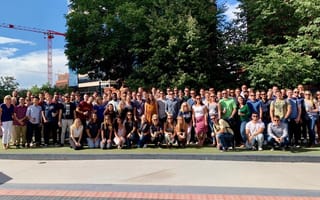Depending on who you ask, an adolescent growth spurt can either be incredibly exciting or painfully awkward. All of a sudden, your clothes won’t fit but it’s also a chance to upgrade your wardrobe.
For companies that are growing up, the same outlook applies. Scaling is an intimidating test most companies will eventually face, but when done successfully, it sets companies up for stability and profitability.
And then it's time to grow again.
We spoke to three Colorado companies who recently experienced their own growth spurts. They outlined the obstacles they faced, how they overcame those challenges and the lessons they learned for next time.

Xactly Corp’s sales performance management platform enables companies to engage and incentivize their sales team members to be top performers. Vice President of Human Resources Leanne Bernhardt said incorporating employees' ideas into their new office design makes everyone feel included in big decisions.
What's an example of a growing pain you experienced as the company scaled? What was done to overcome those challenges?
We view growing pains as opportunities to excel, expand and develop. We call Xactly’s Denver location a “center of excellence.” When we outgrew our intimate space in Lodo, we took up residence in a 40,000-square-foot space on two floors of the Chase Building in downtown Denver. The new space is fresh, award-winning and it retains the very core of who we are as a company and our C.A.R.E values — which stand for customer focus, accountability and respect.
We view growing pains as opportunities to excel, expand and develop.”
What were the most important lessons learned during that period of scale?
The most important lesson learned was to listen to our employees and include them in the design process, as well as keep an open-door policy with executives during the expansion.

Fluid Truck Share allows individuals and businesses to rent trucks anytime, anywhere. James Eberhard, founder and CEO, said expanding in new markets meant adjusting their network providers to ensure the same customer experience.
What's an example of a growing pain you experienced as the company scaled? What was done to overcome those challenges?
Fluid Truck is a community-sharing platform for trucks that provides lenders with the opportunity to make cash off their underutilized assets and borrowers with a simple, affordable way to rent a pick-up truck, cargo van or box truck.
To make our growing vehicle fleet easily accessible, we’ve integrated a telematics solution, safely enabling on-demand, 24/7 vehicle access for our borrowers. As we scaled our fleet beyond Colorado to new markets in Los Angeles and Dallas over the last year, we initially ran into a challenge with our network, as the network provider we first chose added latency, resulting in some disruption to the customer experience. Our team immediately assessed the network latency challenge, identified the root cause and quickly brought on a different network provider to ensure our customers have a seamless rental experience.
...there’s no such thing as too much stress testing.”
What were the most important lessons learned during that period of scale?
For any startup, there’s nothing as simultaneously thrilling and challenging as rapid scale. At Fluid, we’re excited to have significantly grown over the last year, with our vehicles and tech solution now available in three markets across Colorado, Texas and California, and more market openings to come in 2020.
Our biggest takeaway from the learnings of this last year of growth: in the pursuit of achieving a seamless customer experience, there’s no such thing as too much stress testing. Our engineers holistically consider the customer experience, and build solutions that serve both our lenders and borrowers, as well as our fast-growing company and team.

PopSockets LLC sells products that function as a kickstand or grip for your mobile device: you might have one propping up your smartphone right now. After explosive online sales, CEO David Barnett told us how he scaled the company while fulfilling dizzying orders.
What's an example of a growing pain you experienced as the company scaled? What was done to overcome those challenges?
When online sales exploded in the fall of 2016, we were unable to scale up fast enough to fulfill the orders. It was total chaos on the floor of our warehouse, with 65 employees and temps packed into a small space (including packs of dogs running around, slamming into people’s legs and causing employees to spill their Slurpees on our printers).
We had signs on our website directing customers to Amazon. We overcame the challenge by quickly spinning up a fulfillment partner, who now has hundreds of employees in a huge space that runs seven days a week, 24 hours a day. Today, we maintain a small team in Boulder to fulfill six or seven thousand units a day.
When online sales exploded in the fall of 2016, we were unable to scale up fast enough to fulfill the orders.”
What were the most important lessons learned during that period of scale?
Some things are better left to the experts, like manufacturing, fulfillment and logistics.









